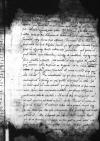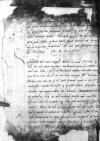Letter #3867
[Ioannes DANTISCUS] to [Stanisław HOZJUSZ (HOSIUS)]Heilsberg (Lidzbark), 1539, end of July
English register:
Dantiscus is pleased with Hozjusz’s favourable opinion of his poem (versiculi). He extends thanks for the help with publishing it and for the valuable corrections.
He has agreed by letter with Georg Hegel that the latter should buy 200 copies of the poem from the printer [Hieronymus Vietor]. Dantiscus will also send the printer some linen for a robe. The man did introduce some errors, but only more learned readers will notice them.
Dantiscus extends thanks for the news and asks to continue receiving updates.
Manuscript sources:
Prints:
| ||||||
Text & apparatus & commentary Plain text Text & commentary Text & apparatus
Ve[nerabilis] [Domine] ....
Salutem et felicitatem.
Q[uod] Dominationi Vestrae visum sic est, quod cf.
Item et bonis equis non raro evenit, qui per scabrosas et fere invias inter saxa vias constanter incedunt, per planas indiligenter gradientes subinde concidunt. Haec non ideo, quod me excusem, verum ut meam accusem oscitantem inscitiam, scribo, quae mihi notior est, quam ut mihi tribuerem vel ambitiose tribui velim quippiam. Non parum itaque Dominationi Vestrae debeo, quae adeo prius extemporariis illis incultisque meis neniis adfuit etc.
De
Pro novis, quae mihi Dominatio Vestra impartiri solet, gratiam habeo. Quod ut sedulo faciat plurimum oro, in eo enim mihi non vulgariter gratificatur Dominatio Vestra.
Quae felicissime valeat.
Ex
[1 ] The cf.

